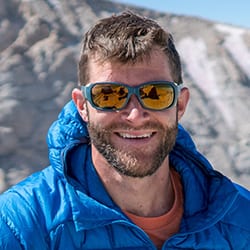My client grasps wildly for options, finding each insufficient. I stand back holding space, ready to support and willing to encourage. Amazingly, she reached this state about half an hour into our first coaching session! After some deep breaths, she tries again. She reaches a small foothold she had not noticed in her frustration and makes an improbable move. Elation overcomes fear. She celebrates at the top of the climb. Then, lowering back to the ground, she does not want to let go of the rope. She hates the feeling of being lowered by someone else, without control. Where to begin?
In the book On Becoming a Leadership Coach, Jennifer Sinek points out that in a “breakdown,” discomfort coupled with vision often leads to the energy necessary for change. As a National Outdoor Leadership School instructor on expeditions, I witness the natural world building great leaders. In fact, research shows that students continue to gain self-esteem and confidence four years after a course! Even the students I teach in REI outdoor skills courses experience a wide range of emotions as they confront challenges. I notice them finding mindfulness, gratitude and self-awareness in only a couple of hours—with no coaching.
Outdoor professionals and guides know the transformative nature of the space in which we work. Yet, guides don’t have the distinctions and competencies in their tool box to capitalize on outdoor experiences for leadership development. Coaches may not always have the technical skills to guide, and still we have become increasingly aware of the power of nature. Many coaches spend time walking or meditating outdoors to reap these benefits. Florence Williams outlines current research showing that time spent in nature reduces stress markers like blood pressure in Nature Fix. More than health benefits, though, people need adventure. People crave exploration!
The Perfect Combination
Outdoor leadership coaching combines adventures provided by guides with conversations fostered by coaches trained in International Coach Federation Core Competencies. During an outdoor adventure, a coach helps translate the client’s experiential learning, emerging emotions and new distinctions into meaningful growth. Specific benefits include the following.
Awareness and Clarity
Being outdoors and experiencing a new adventure often requires putting away electronic devices. Experiencing true solitude on a mountain pass allows us to tap into our intuition as our hourly worries ebb. The real consequences associated with rock climbing or mountaineering also force a level of investment and attention that cannot be replicated in a conference room—clients cannot successfully scale a rock wall without finding mindfulness.
Improved Decision-Making Skills
Adventure and experience provide real consequence. We have put leaders in blizzard conditions to allow them to notice themselves withdrawing due to stress. Leaders open and close their aperture of options as they experience fear even on a short rock climb. Coaches can tap into this real-time decision making to help develop awareness of how leaders make decisions and identify leaders’ preferred mental shortcuts.
Creativity
Learning new skills in a new environment allows leaders to increase divergent thinking—gaining new ways of looking at an old problem. We have all experienced times when our best idea materializes effortlessly on a walk in nature, and research increasingly supports the idea that nature sparks creativity. The clarity from a quieter mind along with divergent thinking can help leaders solve complex problems quickly.
Emotional Intelligence
Being on an adventure outside creates a wide range of emotions, and the shared experience quickly builds trust in the coaching relationship. Fear, joy, apprehension, triumph, frustration, anger, contentment and awe, to name a few, all ignite a transformative conversation. Coaches can help leaders become aware of these emotions in real time and shift into a positive mindset. Additionally, the heightened emotional experience outdoors reinforces learning from each coaching session by engaging neural pathways in multiple parts of the brain.
Presence and Awe
Researchers define the emotion of awe as feeling vastness and a need to accommodate. Coaching in nature inherently takes leaders to awesome places. When leaders experience awe, they are forced to accommodate a larger reality. This helps them gain a healthy perspective on their priorities and can force a healthy reckoning with ego. Awe also pulls clients into the present, allowing an opportunity for coaches to explore what being present feels like with clients.
Outdoor coaching provides all the benefits of traditional coaching amplified through adventure and experiential learning. The experience is like having two great coaches working in tandem for one client. Wild environments automatically create increased presence and clarity for leaders. Real consequences of adventures stimulate leaders to grapple with their decision making. Real-time access to emotions generates greater self-awareness. Having a skilled leadership coach present for this experience creates more meaningful results more quickly by making sense of purposeful adventures!
Disclaimer
The views and opinions expressed in guest posts featured on this blog are those of the author and do not necessarily reflect the opinions and views of the International Coach Federation (ICF). The publication of a guest post on the ICF Blog does not equate to an ICF endorsement or guarantee of the products or services provided by the author.
Additionally, for the purpose of full disclosure and as a disclaimer of liability, this content was possibly generated using the assistance of an AI program. Its contents, either in whole or in part, have been reviewed and revised by a human. Nevertheless, the reader/user is responsible for verifying the information presented and should not rely upon this article or post as providing any specific professional advice or counsel. Its contents are provided “as is,” and ICF makes no representations or warranties as to its accuracy or completeness and to the fullest extent permitted by applicable law specifically disclaims any and all liability for any damages or injuries resulting from use of or reliance thereupon.
Authors
Post Type
Blog
Audience Type
Coach Educators, Experienced Coaches, External Coaches, HR & Organizational Leaders, ICF Assessors, ICF Chapter Leaders, Individuals Interested in Experiencing Coaching, Internal Coaches, Managers/Leaders Using Coaching Skills, Mentor Coaches, New Coaches, Professional Coaches, Team and Group Coaches
Topic
Future of Coaching, Research
Related Posts
Coaching as a Strategic Advantage: What the 2025 Global Coaching Study Reveals
The 2025 ICF Global Coaching Study highlights continued global growth in professional coaching alongside…
Walking the Talk: Reflective Practice for Coaches
Embodying presence and self-care through ICF Competency 2. This article explores how…







